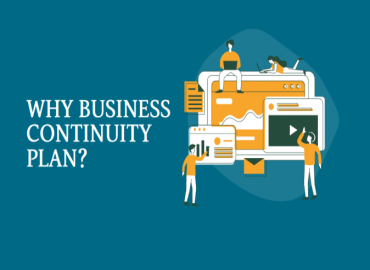Why Business Continuity Plan is Must?
Why Business Continuity Plan?
Aside from helping your business continue its everyday operations, thus allowing you to keep making sales, there are many advantages of having a Business Continuity Plan:
֎ Continue to provide for your customers - As they say out of sight is out of mind. If your business operations stop, your customers may start trying out other products or services from other companies. They may forget about you if they don’t feel your presence. Hence, having a Business Continuity Plan will keep you up and running, you’ll be able to keep hold of your loyal customers and even continue to make new ones, especially if your competitors do not have a business continuity plan and are afflicted with adverse circumstances too.
֎ Possible to work in remote locations - In case of any disaster, if your office can’t be used, you’ll know how to keep key business functions running by thinking ahead about how employees or key personnel can continue working from remote locations. You may also have a certain place ready to be used as your temporary office if needed.
֎ Downtime can be lessened - Time means the money in every business. When disaster strikes it can stop your business operations immediately. Without a business continuity plan, you have to figure out what to do next the moment it happens. However, if you have an existing plan in place, you can immediately start to execute what needs to be done so that you get your business up and running in no time.
Factors to consider when creating a Business Continuity Plan
Common factors that must be considered by every company when devising Business Continuity Plan.
֎ People to manage a Business Continuity Plan - As with any project or program, there should be a committee to take over the management of the business continuity process. This is unlikely to be achieved by a single person hence it is best being a collaborative effort, where people have specific roles.
֎ Analysis of business impact - Determine which products and services are the most important to your business operations. Ranking your products according to how critical their impact on your business is will help you determine which products to prioritize during the recovery phase. Hence, you can prevent bigger losses and maximize the efficiency of your recovery process.
֎ Plan creation - After determining which products, services, and functions are most vital to your business, you can start creating a plan on what to do in the event of a disaster. It should clearly tell the process that must be followed, as well as the specific roles of individuals.
֎ Plan review - Your Business Continuity Plan must be studied carefully for quality. Every area should be reviewed properly to ensure the plan is a success. Since the needs and processes of the company may change, it’s also important to review the plan once or twice a year to ensure that it’s still appropriate for your business.
If you truly wish to establish business security, a Business Continuity Plan isn’t a process that you can easily neglect. Remember, you never know when a disaster can strike! The sooner you get a plan of action, the better it is.


